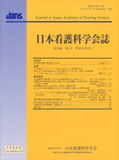Japanese
English
- 販売していません
- Abstract 文献概要
- 参考文献 Reference
- サイト内被引用 Cited by
要旨
目的:がんとともに生きるがん患者の生活経験を捉え,こころの苦痛に関する仮説を得る.
方法:調査期間を2004年3月16日から9月3日とし,一般病院で入院治療を受けている肺がん患者を対象に,半構造化面接を実施し質的分析を行った.
結果:治療効果の判定内容が異なる男性10名の記述データが得られ,病者意識,こころの揺らぎ,魂の訴え,自己効力感の自覚など,こころの苦痛に関する26概念が抽出された.
考察:心理学的ストレスモデルを用いて26概念を整理したところ,看護専門家として介入を要するこころの苦痛とは,「認知的評価に影響する事象」,「情緒的反応に影響する事象」,「コーピング方略」,「認知・行動的反応」からなる総合的なプロセスであると考えられた.
結論:がん看護に従事する看護師には,こころの苦痛をプロセス全体として捉え,実践的なケアに結びつけることが求められている.
Abstract
This study investigated the experiences of patients with cancer to draw a hypothesis of emotional distress.We asked questions of10 men who were undergoing different treatments from March 16 to September 3, 2004. Participants performed a semi-structured interview about their experiences and analysis of their responses was done. As a result, we identified the 26 concepts (ex. invalidism, uncertainty, spirituality, awareness of self-efficacy). The 26 concepts were classified to establish a hypothesis about distress based on a model of psychological stress. The distress that requires intervention by nursing specialists is considered to develop from the following factors:‘events influencing cognitive appraisal,’ ‘events influencing emotional responses,’‘coping strategy,’and ‘cognitive-behavioral responses.’In conclusion,nurses engaged in caring for cancer patients need to understand the processes as a whole and employ these concepts in practice.
Copyright © 2008, Japan Academy of Nursing Science. All rights reserved.


